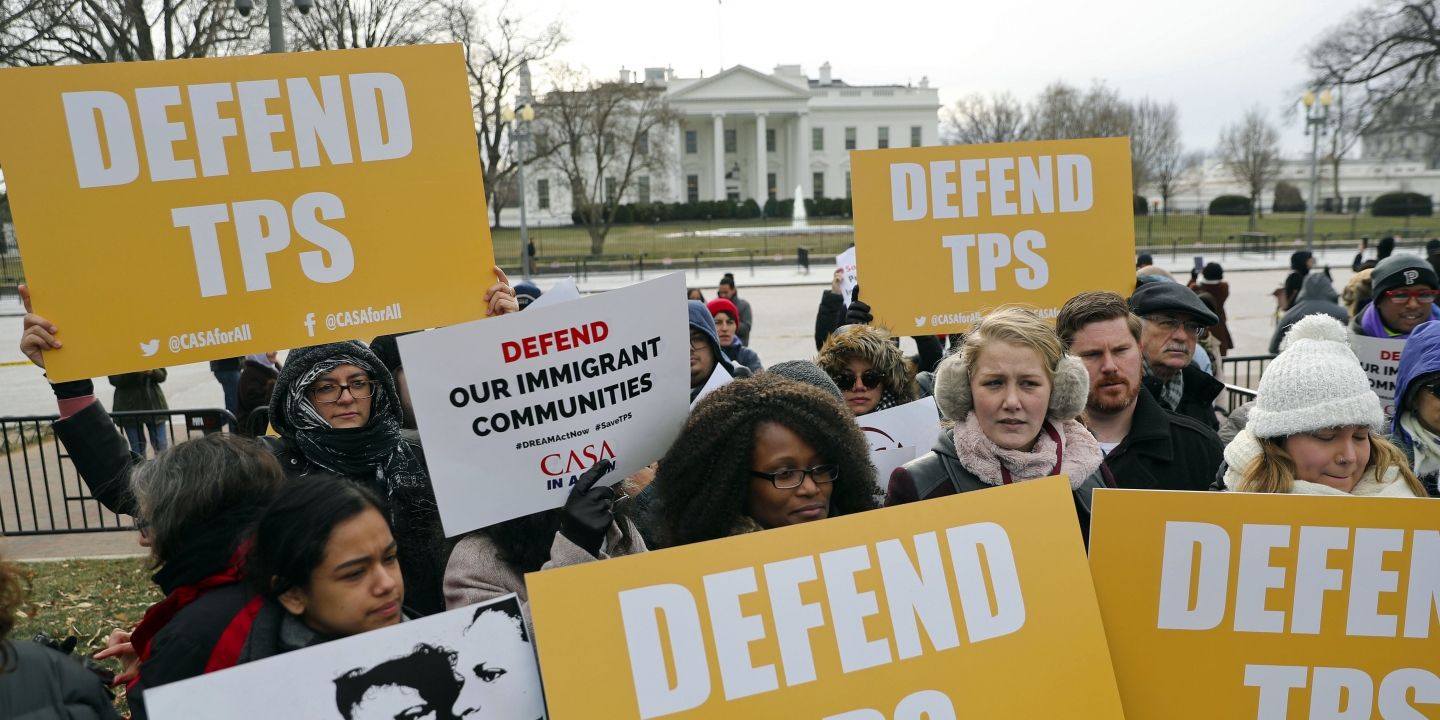This week, the Trump administration announced it would end Temporary Protected Status (TPS) — a humanitarian legal protection for nationals from certain countries to remain and work in the U.S.— for roughly 200,000 El Salvadoran immigrants who have been living in the U.S. for more than 15 years.
Since President Donald J. Trump took office, his administration has been targeting immigrants previously legally authorized to stay in the country and those considered a low-priority for removal. While the public discourse around immigration policy usually involves describing immigrants as “documented” and “undocumented” or “legal” and “illegal,” these terms are too simplistic to accurately describe the legal situation of hundreds of thousands of immigrants in the U.S. today.
Hundreds of thousands of immigrants have been living for years or even decades in the U.S. in a legal limbo or quasi-status. They were legally authorized by the federal government to remain in the U.S. and often issued work permits but did not have a formal status such as citizen, legal permanent resident, or refugee. As immigration reform stalled in Congress, the U.S. immigration system relied heavily on these fragile quasi-statuses with no pathway to residency or citizenship, such as TPS and Deferred Action for Childhood Arrivals (DACA), and other legal mechanisms such as prosecutorial discretion (PD) to protect immigrants with strong ties to the U.S. or who presented humanitarian concerns, and had no serious criminal record, from deportation.
TPS was created through legislation by Congress in 1990 and permitted the government to provide work permits and protection from deportation to nationals of certain countries affected by natural disasters or armed conflict for a designated period of time. In practice, TPS was extended for some countries like El Salvador and Honduras for long periods of time, since 2001 and 1998, respectively. Immigrants with TPS from these Central American countries have been living legally in the U.S. for more than 15 years without a permanent, secure legal status. El Salvadorans with TPS are now parents to almost 200,000 U.S. citizen children.
Another quasi-status, DACA, was introduced by the Obama administration in 2012 to provide a two-year, renewable period of deferred action and work permit to young people who entered the U.S. as minors and were subject to removal, but were deemed low-priority due to their educational attainment and lack of significant criminal record.
Other legal mechanisms including prosecutorial discretion had also long been a feature of the U.S. immigration system and allowed the government to close removal proceeding against immigrants in low-priority cases. As the backlog of removal cases in immigration court reached more than half a million, the government regularly utilized PD to focus its resources on the most serious and dangerous immigration offenders. Supervised stays of removal were also employed for immigrants with final orders of deportation but whose removal presented compelling humanitarian concerns.
Since Trump has taken office, the government has already removed many people who had previously been granted supervised stays of removal and has almost completely ended the practice of granting PD in immigration court. The government has also moved to re-open cases previously closed as a matter of prosecutorial discretion.
The Trump administration has already decided to end DACA and TPS for countries like Nicaragua, Sudan and Haiti in addition to El Salvador. These changes will leave hundreds of thousands of long-term immigrant residents with no legal protection from deportation and no work permits. The unauthorized population in the country will grow, which will have devastating consequences for the U.S. economy, U.S families, and the already overburdened immigration court system.
While it is easy to look at immigration legality in black-and-white terms, it does not capture the reality of the situation — that many people who have been living in the U.S. legally without secure immigration statuses, like those with TPS, are good people who benefit the U.S., and are in their current legal situation through no fault of their own. They have been authorized to remain in the U.S., working lawfully and paying taxes, and establishing families in U.S. communities. Immigrants with these quasi-statuses are not the “bad hombres” Trump promised to deport during his campaign and have not committed serious crimes (or they would have lost their authorization).
We have already heard numerous stories of hard-working, law-abiding parents being separated from their U.S. citizen children. Ending TPS for El Salvador will destroy established immigrant communities throughout the U.S. As DACA ends, we will hear heartbreaking stories of promising young people needlessly ripped from their schools and communities and deported to countries that they barely recognize.
Although Trump has exploited the system of fragile immigration legality for his political benefit, he did not create it. Until the Congress establishes a secure legal path to residency and citizenship for these immigrants, they will be vulnerable. Not only will they and their families suffer, but our country will suffer without them.


